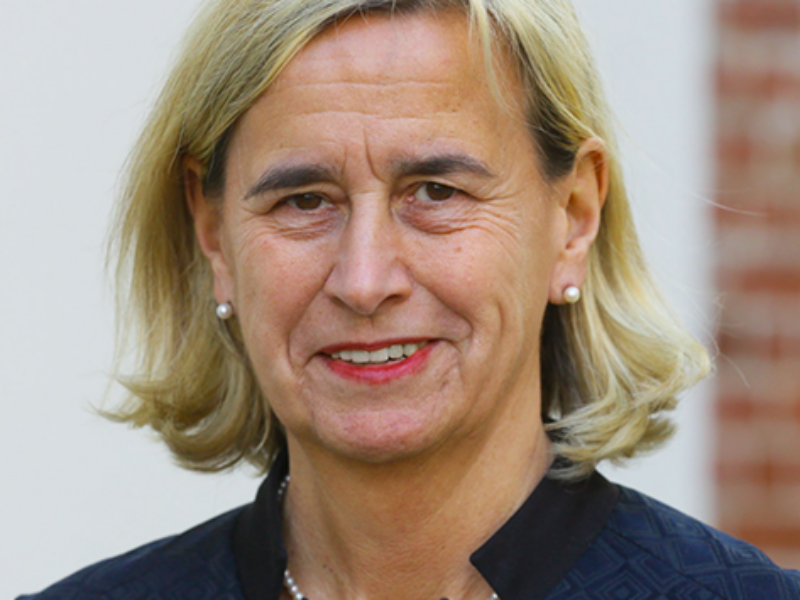Prof. Dr. Annette Grüters-Kieslich im BPI-Themendienst „Seltene Erkrankungen“
In der aktuellen Ausgabe des BPI Themendienstes „Seltene Erkrankungen“ schildert Prof. Dr. Annette Grüters-Kieslich, Vorstandsvorsitzende der Eva Luise und Horst Köhler Stiftung, Probleme und Herausforderungen, denen Menschen mit Seltenen Erkrankungen gegenüberstehen, und zeigt Ansatzpunkte für wichtige Verbesserungen auf. Zugleich betont sie: „Anhand von Seltenen Erkrankungen lernen wir viel für die Behandlung von häufigen Krankheitsbildern und davon profitieren alle!”
Seltene Erkrankungen: noch immer Stiefkinder der Medizin
„Leider sind die Seltenen Erkrankungen noch immer in weiten Teilen die Stiefkinder der Medizin. Es fehlt an strukturierten Versorgungswegen, an Spezialistinnen und Spezialisten, an Investitionen in die Forschungsstruktur“, so Prof. Grüters-Kieslich. Gezielte Behandlungen seien häufig nicht möglich, da es nur für rund 160 der über 8.000 Seltenen Erkrankungen ursächliche Therapien und spezifische Medikamente gebe. Meist dauert es viele Jahre bis zur Diagnose und mitunter werden kritische Zeitfenster für eine rechtzeitige Intervention verpasst, „mit dann natürlich besonders tragischen Folgen für die Betroffenen“.
TRANSLATE-NAMSE: überzeugende Blaupause für eine bessere Versorgung von Patient:innen mit Seltenen Erkrankungen
Wie es anders gehen kann, habe das vom Innovationsfonds des Gemeinsamen Bundesausschuss geförderte Verbundprojekt TRANSLATE-NAMSE gezeigt, in dem neun Zentren für Seltene Erkrankungen (ZSE) und vier Humangenetische Institute in einem überregionalen multiprofessionellen Netzwerk Ansätze für eine strukturierte Versorgung erprobt haben. „Insbesondere die interdisziplinären Fallkonferenzen haben sich als sehr hilfreich erwiesen, um bei komplexen Fällen weiterzukommen. Viele Patientinnen und Patienten, die zuvor jahrelang fehlbehandelt durch das Gesundheitswesen irrten, haben im Rahmen des Projekts innerhalb eines halben Jahres eine präzise Diagnose erhalten“, erläutert Prof. Grüters-Kieslich. „Das ist ein großartiger Erfolg!“
Neugeborenen-Screenings: Frühe Diagnostik ist essentiell
Die erfahrene Kinderärztin weist darauf hin, dass die meisten Seltenen Erkrankungen im Kindesalter ausbrechen: „Viele betroffene Kinder werden niemals ein selbstständiges Leben führen können, mindestens 1.000 versterben jährlich allein in Deutschland“. Eine frühe Diagnostik, etwa im Rahmen von Screening-Untersuchungen bei Neugeborenen, ist nach ihrer Auffassung essentiell: „Die Screenings erlauben uns, schwere Störungen frühzeitig zu entdecken und betroffene Kinder umgehend behandeln zu können. In vielen Fällen ist das entscheidend dafür, dass die Kinder überleben und sich normal entwickeln.“ Inzwischen wird für 17 Krankheiten ein solches Screening angeboten, darunter angeborene Stoffwechselerkrankungen und Hormonstörungen. Dank vieler neuer Therapieansätze kommen immer mehr Krankheiten für ein Screening in Frage. Prof. Grüters-Kieslich betont jedoch auch: „Grundsätzlich gilt, dass ein Neugeborenen-Screening nur dann Sinn macht, wenn sich daraus auch eine Behandlungsoption ergibt, die die Prognose des Kindes entscheidend verbessert.“ Zuletzt wurden Screening-Untersuchungen für die Sichelzellkrankheit und die spinale Muskelatrophie eingeführt.
Finanzierung: Hohen Investitionskosten steht enormer Nutzen gegenüber – individuell und allgemein
Für die Behandlung der spinalen Muskelatrophie steht mittlerweile unter anderem die Gentherapie Zolgensma zur Verfügung, die im Jahr 2020 als „teuerstes Medikament der Welt“ für Schlagzeilen gesorgt hat. Für Annette Grüters-Kieslich steht den hohen Kosten jedoch ein enormer Nutzen sowohl für Patientinnen und Patienten als auch für die gesamte Medizin gegenüber: „Es ist ein großartiger Fortschritt, dass mit einer Injektion die Spinale Muskelatrophie behandelbar wird. Kinder, die zuvor nur wenige Jahre lebten und erheblich eingeschränkt waren, überleben und lernen auf einmal laufen und Rad fahren.“ Wenn der Therapievorteil derart offensichtlich sei, sollte sich die öffentliche Debatte nicht auf die Kostenseite fokussieren, sondern auf den Nutzen für die Patientinnen und Patienten, so Grüters-Kieslich. Natürlich seien Innovationen wie hochpräzise gentherapeutische Verfahren anfangs sehr teuer, doch stehe den Investitionen nicht nur ein individueller Patientennutzen, sondern auch ein allgemeiner Erkenntnisgewinn gegenüber. Die Forschung an Seltenen Erkrankungen treibe die sogenannte personalisierte Medizin voran. Prof. Grüters-Kieslich ist überzeugt: „Davon profitieren letztlich alle!“
Den gesamten Beitrag finden Sie hier: BPI Themendienst – Seltene Erkrankungen



